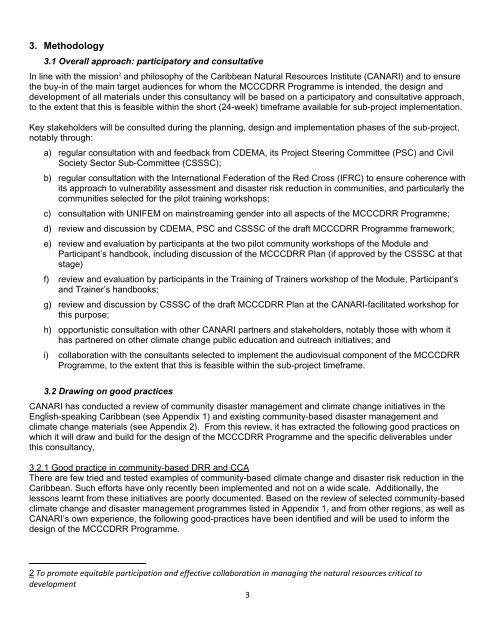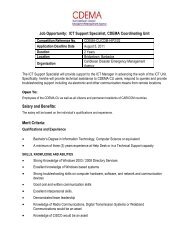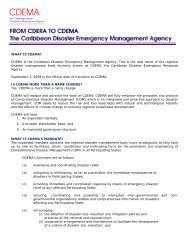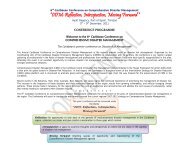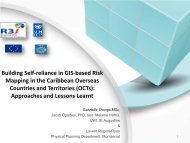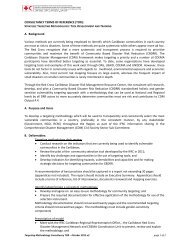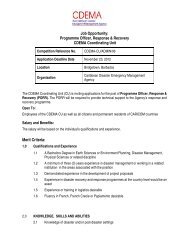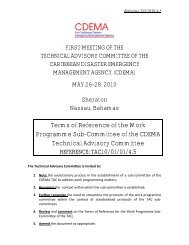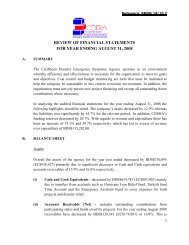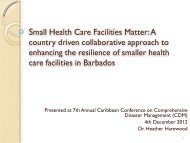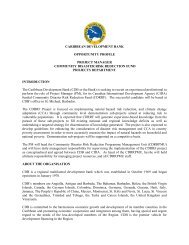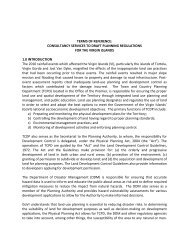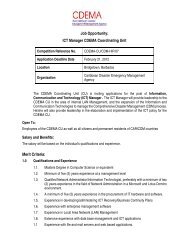You also want an ePaper? Increase the reach of your titles
YUMPU automatically turns print PDFs into web optimized ePapers that Google loves.
3. Methodology<br />
3.1 Overall approach: participatory and consultative<br />
In line with the mission 2 and philosophy of the Caribbean Natural Resources Institute (CANARI) and to ensure<br />
the buy-in of the main target audiences for whom the MCCCDRR Programme is intended, the design and<br />
development of all materials under this consultancy will be based on a participatory and consultative approach,<br />
to the extent that this is feasible within the short (24-week) timeframe available for sub-project implementation.<br />
Key stakeholders will be consulted during the planning, design and implementation phases of the sub-project,<br />
notably through:<br />
a) regular consultation with and feedback from <strong>CDEMA</strong>, its Project Steering Committee (PSC) and Civil<br />
Society Sector Sub-Committee (CSSSC);<br />
b) regular consultation with the International Federation of the Red Cross (IFRC) to ensure coherence with<br />
its approach to vulnerability assessment and disaster risk reduction in communities, and particularly the<br />
communities selected for the pilot training workshops;<br />
c) consultation with UNIFEM on mainstreaming gender into all aspects of the MCCCDRR Programme;<br />
d) review and discussion by <strong>CDEMA</strong>, PSC and CSSSC of the draft MCCCDRR Programme framework;<br />
e) review and evaluation by participants at the two pilot community workshops of the Module and<br />
Participant’s handbook, including discussion of the MCCCDRR Plan (if approved by the CSSSC at that<br />
stage)<br />
f) review and evaluation by participants in the Training of Trainers workshop of the Module, Participant’s<br />
and Trainer’s handbooks;<br />
g) review and discussion by CSSSC of the draft MCCCDRR Plan at the CANARI-facilitated workshop for<br />
this purpose;<br />
h) opportunistic consultation with other CANARI partners and stakeholders, notably those with whom it<br />
has partnered on other climate change public education and outreach initiatives; and<br />
i) collaboration with the consultants selected to implement the audiovisual component of the MCCCDRR<br />
Programme, to the extent that this is feasible within the sub-project timeframe.<br />
3.2 Drawing on good practices<br />
CANARI has conducted a review of community disaster management and climate change initiatives in the<br />
English-speaking Caribbean (see Appendix 1) and existing community-based disaster management and<br />
climate change materials (see Appendix 2). From this review, it has extracted the following good practices on<br />
which it will draw and build for the design of the MCCCDRR Programme and the specific deliverables under<br />
this consultancy,<br />
3.2.1 Good practice in community-based DRR and CCA<br />
There are few tried and tested examples of community-based climate change and disaster risk reduction in the<br />
Caribbean. Such efforts have only recently been implemented and not on a wide scale. Additionally, the<br />
lessons learnt from these initiatives are poorly documented. Based on the review of selected community-based<br />
climate change and disaster management programmes listed in Appendix 1, and from other regions, as well as<br />
CANARI’s own experience, the following good-practices have been identified and will be used to inform the<br />
design of the MCCCDRR Programme.<br />
2 To promote equitable participation and effective collaboration in managing the natural resources critical to<br />
development<br />
3


